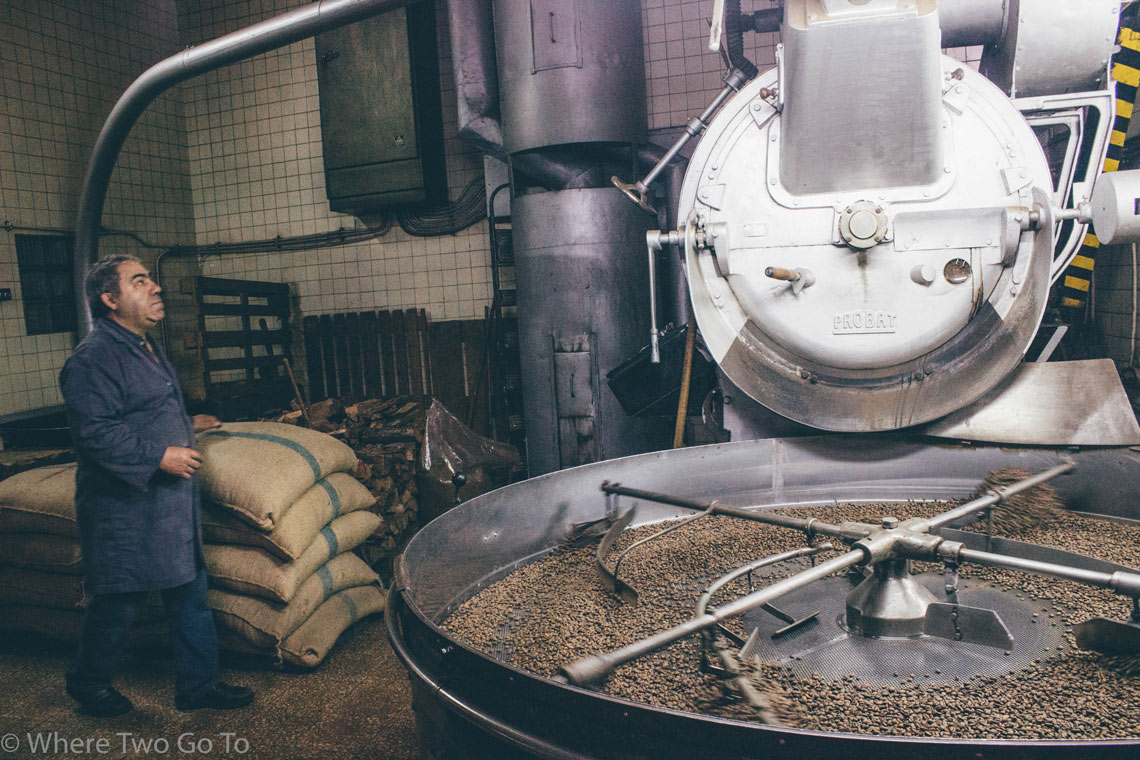This week we bring you a sip of nostalgia. Recently, we found out (a friend gave us the tip) that in Lisbon, there is a place where the coffee roasting is still made the old fashioned way, wood-fire roasted.
Flor da Selva is a small venue lost in the middle of Madragoa district, a typical old Lisbon neighbourhood. This coffee roaster house was established in 1950 and ever since has been spreading a mesmerising fragrance all over Madragoa every Monday and Wednesday mornings. We wouldn’t mind living on a street nearby and literally wake up with the smell of coffee. 🙂
It is a family business that has been owned for three generations and the technique used is the same one as 40 years ago.
Before you keep reading, what do you think it’s the meaning of “Flor da Selva?” As some of you might have guessed, it’s actually the name of the coffee flower, also known as coffea.
As the guide of the house invites us inside the tiny factory, we are instantly waken up by the fresh coffee aroma. With the enthusiasm of perpetuating the family business (he is also the owner’s son and manager of the house), Francisco initiates us in the history of the place and the entire roasting process. Here is a sum-up:
- The coffee green beans are sucked to a funnel on top of the machine.
- From the funnel, the coffee beans are dropped inside the machine (maximum capacity of 120kg (265lb) or the equivalent of two bean bags).
- Next, the fire beneath will roast the beans; this will take around 15 to 20 minutes, at a temperature rounding 200ºC (392ºF).
- The wood used for roasting is the evergreen oak (or holm oak), which when dry does not have any resin, bringing out the best in the quality coffee beans.
- There is a small scoop inserted in the machine’s door, which allows the controller to take out a few beans in order to check the coloring for the appropriate roasting. To compare, he uses old roasted beans.
- Then, according to the coffee’s intensity requested, the controller drops the beans inside the cooling pan which will filter undesired elements such as corn or small stones.
- The final stage is to gather the beans in a container from where they will be packed and distributed.
The roasting equipment used is a Probat drum roaster already 40 years old and it is world-wide famous for being a top-notch machine. There are only two such machines in the world: here, at Flor da Selva and another one in Switzerland.
In this beautiful video you can get a better idea of the roasting process at Flor da Selva. It’s truly a crafting process that requires serious skills.
As we are engaged in conversation with our guide, locals enter and leave. They love this coffee and are assiduous customers. We also notice the 60 kg coffee bean bags prepared at the entrance to be distributed to various restaurants and coffee shops across the city.
The coffee at Flor da Selva comes from various corners of the world, Central and South America, Africa and Asia, either Robusta or Arabica.
Curiosity: We learned that the Portuguese espresso is predominantly made of Robusta. The main difference between Robusta and Arabica is that the first produces stronger coffee, and needs more time to roast, whereas the latter produces more aromatic coffee and needs less roasting time. Usually, the more Arabica the coffee has the more expensive it is.
Nowadays, Flor da Selva brands are Orquídea (the strongest), Magnólia (balanced), Estrelícia (the mildest).
Go to Flor da Selva because “coffee is always a good idea”. Make sure you don’t drink any cup before you arrive, as you’ll be naturally waken up by the fresh smell of roasted coffee beans…which is priceless! 🙂






















